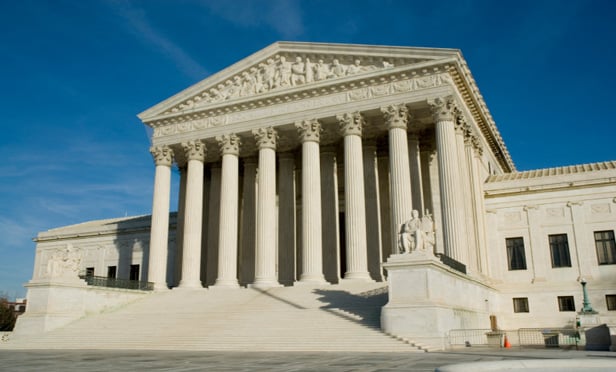Features

Successful Hybrid Plans Offer 'Best of Both Worlds'
We're seeing is a variety of successful measures that are designed to help attorneys get what they want: a best-of-both worlds scenario where they keep some work-from-home and fold-in an opportunity to intentionally connect and collaborate with colleagues in the office.
Features

The Future of AI Is More Ironman than Terminator
Many fear cyborgs stealing corner offices from rainmakers, that the future will be Robolawyers instead of humans. The reality is that the most powerful AI today, when applied to complex areas like legal, is more reliant on human interaction, not less.
Features

U.S. Supreme Court Will Hear Political Football Section 230 Case — Why This One?
The Supreme Court has decided in the context of national security to consider the parameters of, and possible limits to, "Section 230" liability protections for social media companies. The question is why this case? The Supreme Court has decided to accept a case that, while sounding narrow and technical, actually goes to the heart of the way many Internet platforms operate — algorithmic targeted content recommendations.
Features

Legal Tech: The Attorney-Client Privilege Purpose Requirement and E-Discovery
On Jan. 9, the U.S. Supreme Court heard oral argument on whether the attorney-client privilege protects against disclosure of dual-purpose communications — where the communications contain both legal and nonlegal advice.
Columns & Departments

Live Webinar: The Crypto Landscape Post-FTX
On Feb. 15 at 4 p.m. ET, Cybersecurity Law & Strategy will present a complimentary live webinar titled "The Crypto Landscape Post-FTX." The presentation will cover the current status and near-future outlook for the blockchain (crypto) sector.
Columns & Departments

Development
Invalid Condition on Special Permit Does Not Invalidate Permit Landmark Commission's Certificate of Appropriateness Upheld Area Variances Upheld Negative Declaration on Zoning Amendment Upheld BSA Misconstrued Curb Level Provision In Zoning Resolution
Features

How Much Deference to Public Use Determinations?
How closely will New York courts scrutinize exercises of the eminent domain power? Until recently, courts have been quite deferential when entities clothed with eminent domain power have determined that private property is necessary for public use. Two recent decisions, however, suggest that there are limits to that deference.
Columns & Departments

Real Property Law
Tax Deed Invalid for Inadequate Notice Mistaken Description In Foreclosure Action on Neighboring Parcel Does Not Affect Landowner's Parcel
Columns & Departments

Landlord & Tenant Law
Ambiguities Prevent Summary Judgment In Action on Guaranty
Columns & Departments

Co-ops and Condominiums
Unit Owner Failed to Establish Full Title As Surviving Joint Tenant Association Denied Summary Judgment In Unit Owner's Claim Of Improper Waiver of Dues
Need Help?
- Prefer an IP authenticated environment? Request a transition or call 800-756-8993.
- Need other assistance? email Customer Service or call 1-877-256-2472.
MOST POPULAR STORIES
- Judge Rules Shaquille O'Neal Will Face Securities Lawsuit for Promotion, Sale of NFTsA federal district court in Miami, FL, has ruled that former National Basketball Association star Shaquille O'Neal will have to face a lawsuit over his promotion of unregistered securities in the form of cryptocurrency tokens and that he was a "seller" of these unregistered securities.Read More ›
- Compliance Officers and Law Enforcement: Friends or Foes?<b><i>Part Two of a Two-Part Article</b></i><p>As we saw in Part One, regulators have recently shown a tendency to focus on compliance officers who they deem to have failed to ensure that the compliance and anti-money laundering (AML) programs that they oversee adequately prevented corporate wrongdoing, and there are several indications that regulators will continue to target compliance officers in 2018 in actions focused on Bank Secrecy Act/AML compliance.Read More ›
- Bankruptcy Sales: Finding a Diamond In the RoughThere is no efficient market for the sale of bankruptcy assets. Inefficient markets yield a transactional drag, potentially dampening the ability of debtors and trustees to maximize value for creditors. This article identifies ways in which investors may more easily discover bankruptcy asset sales.Read More ›
- Structuring Strategies for Off-Balance-Sheet Treatment of Real Property LeasesThe Financial Accounting Standards Board released a new set of lease accounting standards, ASC 842, which went into effect earlier this year. Most significantly, publicly traded companies are now obligated to list all leases of 12 months or longer on their balance sheets as both assets and liabilities. Large private companies will follow suit in 2020.Read More ›
- Removing Restrictive Covenants In New YorkIn Rockwell v. Despart, the New York Supreme Court, Third Department, recently revisited a recurring question: When may a landowner seek judicial removal of a covenant restricting use of her land?Read More ›
